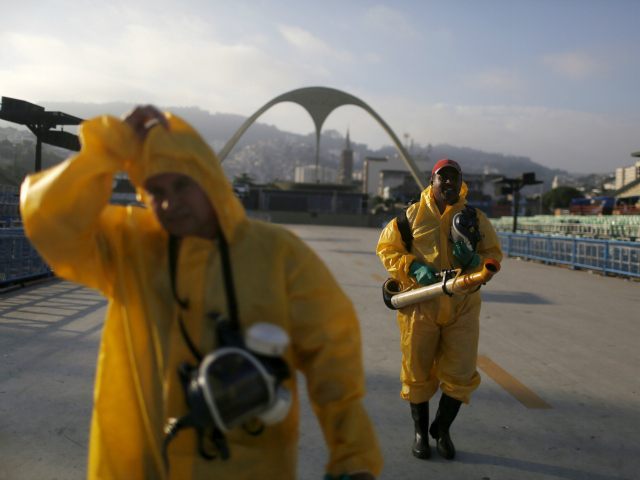Zika is primarily a mosquito-borne virus that is very difficult to detect in most human carriers, currently impossible to cure, spreading very rapidly, and believed to increase the risk of birth defects when contracted by pregnant women.
There seems to be little hope of containing the outbreak without killing the mosquitoes, but the most effective pesticide, DDT, has been banned since the first great junk-science scare perpetrated by the environmentalist movement. Millions of people have died unnecessarily over the past half-century as a result. Are we going to consign millions more to death or disability, because the Greens can’t bear to give up their first “big win?”
A growing chorus of voices is calling for the return of DDT, including Dr. Jane Orient, executive director of the Association of American Physicians and Surgeons. Dr. Orient pointed out that other pesticides are “far more toxic and expensive” in a recent interview with Breitbart News. Also, mosquito-control experts say the bugs are developing a resistance to alternative pesticides.
Another strategy proposed for combating Zika involves genetically engineering mosquitoes to wipe out their population, by making it impossible for them to breed. We might ask if the cost and potential risk of such techniques – “gene editing” is considered a potential national security threat by the intelligence community – makes DDT the better alternative.
An awful lot could go wrong with unleashing swarms of gene-edited mosquitoes, and even in the best-case scenario, it would take much longer to eliminate mosquito populations with genetic techniques. Effective DDT deployment could begin almost immediately.
Another version of this strategy involves using radiation to sterilize male mosquitoes and releasing millions of them into the wild, where they would displace fertile males in competition for females, producing a smaller crop of offspring. This approach would be even more time-consuming and less effective than gene-editing the mosquito species to effectively become extinct, and it would require the regular creation of radioactively-sterilized male mosquito batches to keep the population down.
Advocates of fighting Zika with DDT include Jay Ambrose at the Tampa Tribune, who declares, “Warrior greenies, get out of the way. You’ve done enormous hurt in this world, you appear prepared to keep it up, and it’s time to allow people their health, their lives and a chance to fight back more effectively against mosquitoes that have been having at us from ancient times to right this minute.”
Ambrose notes that Dr. Lyle Petersen, director of vector-borne diseases at the Centers for Disease Control, has also favored DDT deployment. “That concern about DDT has to be reconsidered in the public health context,” Petersen told the New York Times.
“I have lost two friends to West Nile virus and have no patience for the environmental people who condemn our most fragile populations to death and diseases,” Dr. Michael Swickard wrote this week, calling for a fresh look at DDT to keep Zika at bay. “If they, the environmentalists wish to die, so be it, but the great martyrs of our world did not send women and children into the wilderness instead of going themselves.”
“Perhaps it’s time to give mosquito eradication another chance. And those efforts might include the use of potent pesticides like DDT, although in a more judicious and measured manner,” mused the Salem News, whose editors are much more accepting of past warnings against widespread use of the pesticide than other critics of the ban. “A careful and scientifically guided use of these pesticides can have their desired effect on mosquito populations while minimizing any environmental side effects.”
The Salem News noted that although the World Health Organization has declared Zika a global emergency, most of their recommendations amount to common-sense warnings about staying away from mosquitoes in the outbreak areas, and it is almost impossible to ensure such recommendations are followed.
“By forbidding DDT and relying on more expensive, less effective methods of prevention, we are causing immense hardship. Small environmental losses are inferior to saving thousands of human lives and potentially increasing economic growth in developing nations,” wrote senior fellow Diana Furchtgott-Roth at the Manhattan Institute.
She found it somewhat absurd that the more mild Zika virus could produce enough anxiety to crack the DDT ban after malaria and other deadly mosquito-borne diseases had already killed millions, and knocked $100 billion off the GDP of sub-Saharan Africa… but if Zika is the plague that finally wakes the world up, so be it.
Much has changed since the Sixties.
Our technology is more advanced, and we have learned a great deal about how to handle substances like DDT. We need to make a decision about using an effective weapon against Zika… or allowing the virus to enter blood supplies and mosquito populations in the United States, at which point the pressure for a return to effective pesticides will become overwhelming. By that point, untold numbers of people in South America, the Caribbean, and perhaps soon the Zika-friendly climes of Asia will have suffered needlessly.
DDT was banned because of a false panic about thin bird egg shells. Some are advising Zika-affected areas to minimize the risk of birth defects by not having children. Is this really a hard choice to make?

COMMENTS
Please let us know if you're having issues with commenting.